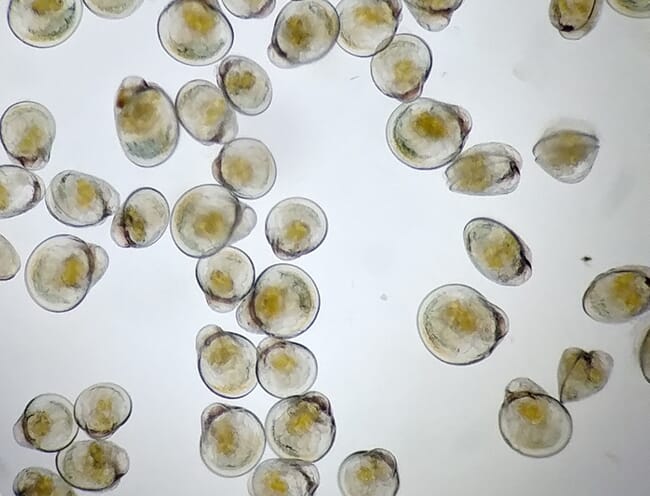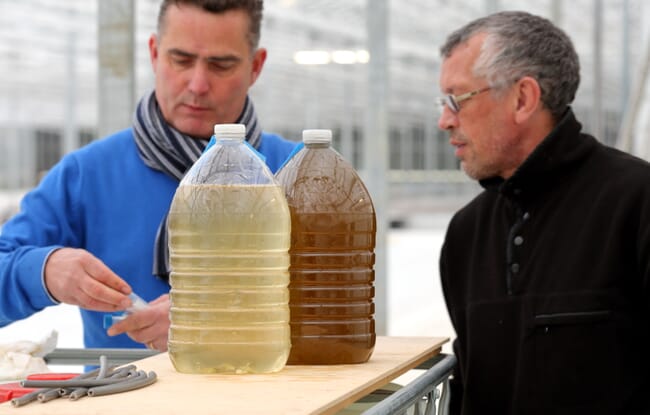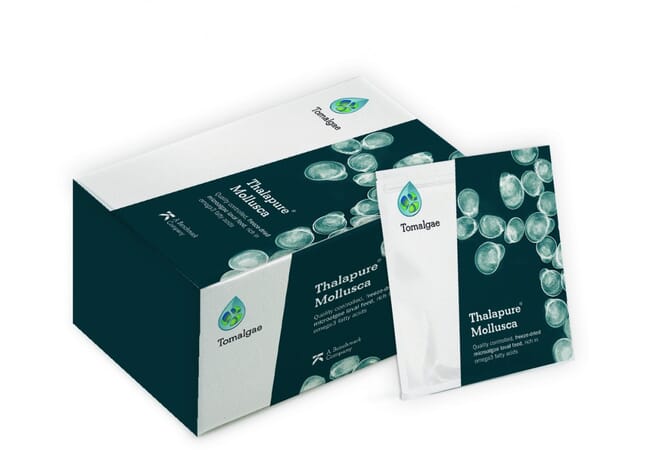The US produces 140,000 tonnes of oysters a year, making it the world’s third largest producer of the bivalves - just behind Japan (300,000 tonnes) and South Korea (280,000 tonnes), but double that of France (70,000 tonnes).

© TomAlgae
TomAlgae, which cultivates diatoms (Bacillariophyceae sp.) at its production facility in Belgium, recently made impressive inroads into the South Korean oyster market, where a growing number of hatcheries are now using the company’s key bivalve product Thalapure Mollusca. And it is now hoping to emulate this success in the US, in part by providing one of the 11 ICX (Industry Connection) prizes – the winners of which were announced yesterday – at this year’s Fish 2.0 competition.
“North American is the third largest oyster producer in the world,” explains William van der Riet, CEO and founder of TomAlgae. “And by providing an ICX prize to two oyster producers we hope that we can not only help them to grow their businesses by sharing our expertise in algae, but we can also learn more about the US market from them – the knife cuts both ways.”
The winners of the prize were Panacea Oysters of Spring Creek, Florida, which is restoring oyster farming in Apalachicola Bay by creating a unified brand and guaranteeing purchases to farmers; and Pensacola Bay Oyster Company, another Floridian firm, which is producing premium oysters for the half-shell market, with the goal of restoring the Gulf Coast’s environment and working waterfronts.

© TomAlgae
“Live algae is currently used to feed oyster larvae for up to four weeks in US oyster hatcheries,” William explains. “We aim to scale-down the use of this live algae at this critical stage and encourage hatcheries to work with our product – freeze-dried, phototrophically produced diatoms – so that the hatcheries can focus on the production of oyster larvae, not of algae.”
Reflecting on the ICX prizes, Fish 2.0 founder and executive director Monica Jain said they exemplify what the competition is all about - growing the sustainable seafood industry through connections and learning.

“We’re grateful to these forward-thinking prize givers for offering their time and resources to these ventures and to the field,” she said. “Over the past years, these prizes and the partnerships that result from them have led to extraordinary growth acceleration for the winning ventures and the prize givers. These are golden opportunities.”
More about Fish 2.0
The competition’s cash prize winners were announced on 8 November at the close of the Fish 2.0 2017 Innovation Forum at Stanford University. Those awards went to the eight seafood ventures—one in each of the competition’s six regional and two global tracks—that earned the highest scores from investor-judges.
All of the 39 finalists from around the world who presented at the Forum were eligible for ICX prizes, which allow for ventures to gain market insights and expertise from industry leaders who support growth and innovation in sustainable seafood.
The other ICX prizes and winners, by prize sponsor were:
Albion Farms & Fisheries Prize: A full day of expert consultation with the Albion Farms & Fisheries senior leadership team and CSO, including advice and insight on opening new market opportunities and business growth strategies.
Winner: Fish Extend of Santiago, Chile, whose product extends the shelf life of fresh fish using natural ingredients, reducing production losses due to spoilage.
Alltech Prize: Two passes for ONE: the Alltech Ideas Conference in Lexington, Kentucky, in 2018, and private meetings in Lexington with members of the Alltech team.
Winners: NovoNutrients of Sunnyvale, California (also the competition’s Supply Chain Innovation track winner), which is using food-grade bacteria to make fish food from industrial carbon emissions; and ShellBond of Wilmington, North Carolina, whose technology solves problems in oyster habitat restoration, spat sedimentation, oil cleanup and nonorganic antioxidants in salmon farms.
Australis Aquaculture Prize: One-day consultation with the Australis CEO and leadership team on how to introduce new products to market and/or scale an aquaculture enterprise.
Winner: VakSea of Baltimore, which has developed a patented oral vaccine delivered via fish feed that promotes healthier fish and decreases antibiotic use in aquaculture.
Calvert Impact Capital (formerly Calvert Foundation) Prize: Half-day expert consultation with Calvert Impact Capital lending staff who lead its Women Investing in Women program, including mentorship, guidance and information on accessing financing.
Winner: American Unagi of Thomaston, Maine (the competition’s short-pitch winner), which grows locally harvested glass eels to market size in a land-based aquaculture system.
FishChoice Prize: Two half-day meetings or one full-day meeting for up to three people with the FishChoice leadership team, who will share FishChoice’s expertise on sustainable seafood ratings and certifications.
Winner: Fair Agora of Bangkok, whose Verifik8 monitoring and verification software collects data from fish farms and cooperatives to help seafood buyers make safe and responsible choices.
IntraFish Prize: Two tickets to the IntraFish Seafood Investor Forum in either New York or London.
Winners: ColomboSky of Verona, Italy, whose Aqua-X technology for the marine aquaculture industry uses satellite images, in-situ data and expert supervision to monitor and forecast water quality; and TunaSolutions of Sydney, a fair-trade online marketplace for the tuna industry that connect fishers with buyers and facilitates real-time trading through a series of online auctions.
Rabobank International Prize: Half-day meeting and consultation with the Rabobank North American seafood lending team, and a consultation with Rabobank’s global seafood analyst.
Winner: SmartCatch of Palo Alto, California, whose flagship product is DigiCatch, a remotely controllable video, lighting and oceanographic catch monitoring system.
RSF Social Finance Prize: One-day visit to the RSF Social Finance offices for coaching sessions with the social enterprise lending team and the RSF marketing team.
Winner: Real Oyster Cult of Duxbury, Massachusetts (also the competition’s New England track winner), which ships fresh oysters from all over North America direct to consumers overnight.
Stavis Seafoods Prize: Half-day consultation with the Stavis Seafoods CEO and responsible sourcing manager, including mentorship, guidance and information on accessing new market opportunities.
Winner: OneForNeptune of Santa Fe, New Mexico, which offers healthy, high-protein snack foods made from underutilized and undervalued U.S. groundfish species and industry offcuts.
Wabel: the Wabel Retail Prize includes an invitation to the Wabel Summit, at least eight meetings with fish buyers from Europe’s largest retail groups, and more.
Winner: Northline Seafoods of Sitka, Alaska (also the competition’s U.S. West Coast track winner), whose unique floating processing facility eliminates waste and extends the shelf life of sustainable wild salmon.




